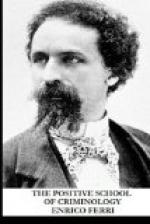OF CRIMINOLOGY.
II.
We saw yesterday in a short historical review that the classic cycle of the science of crime and punishment, originated by Cesare Beccaria more than a century ago, was followed in our country, some twenty years since, by the scientific movement of the positive school of criminology. Let us see today how this school studied the problem of criminality, reserving for tomorrow the discussion of the remedies proposal by this school for the disease of criminality.
When a crime is committed in some place, attracting public attention either through the atrocity of the case or the strangeness of the criminal deed—for instance, one that is not connected with bloodshed, but with intellectual fraud—there are at once two tendencies that make themselves felt in the public conscience. One of them, pervading the overwhelming majority of individual consciences, asks: How is this? What for? Why did that man commit such a crime? This question is asked by everybody and occupies mostly the attention of those who do not look upon the case from the point of view of criminology. On the other hand, those who occupy themselves with criminal law represent the other tendency, which manifests itself when acquainted with the news of this crime. This is a limited portion of the public conscience, which tries to study the problem from the standpoint of the technical jurist. The lawyers, the judges, the officials of the police, ask themselves: What is the name of the crime committed by that man under such circumstances? Must it be classed us murder or patricide, attempted or incompleted manslaughter, and, if directed against property, is it theft, or illegal appropriation, or fraud? And the entire apparatus of practical criminal justice forgets at once the first problem, which occupies the majority of the public conscience, the question of the causes that led to this crime, in order to devote itself exclusively to the technical side of the problem which constitutes the juridical anatomy of the inhuman and antisocial deed perpetrated by the criminal.
In these two tendencies you have a photographic reproduction of the two schools of criminology. The classic school, which looks upon the crime as a juridical problem, occupies itself with its name, its definition, its juridical analysis, leaves the personality of the criminal in the background and remembers it only so far as exceptional circumstances explicitly stated in the law books refer to it: whether he is a minor, a deaf-mute, whether it is a case of insanity, whether he was drunk at the time the crime was committed. Only in these strictly defined cases does the classic school occupy itself theoretically with the personality of the criminal. But ninety times in one hundred these exceptional circumstances do not exist or cannot be shown to exist, and penal justice limits itself




